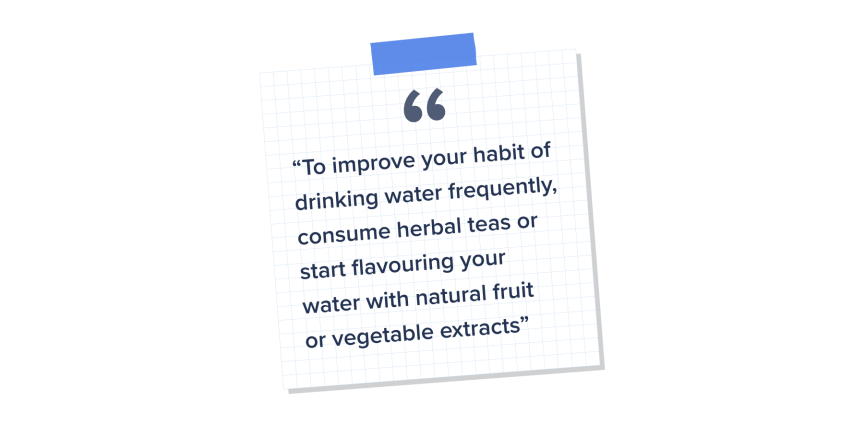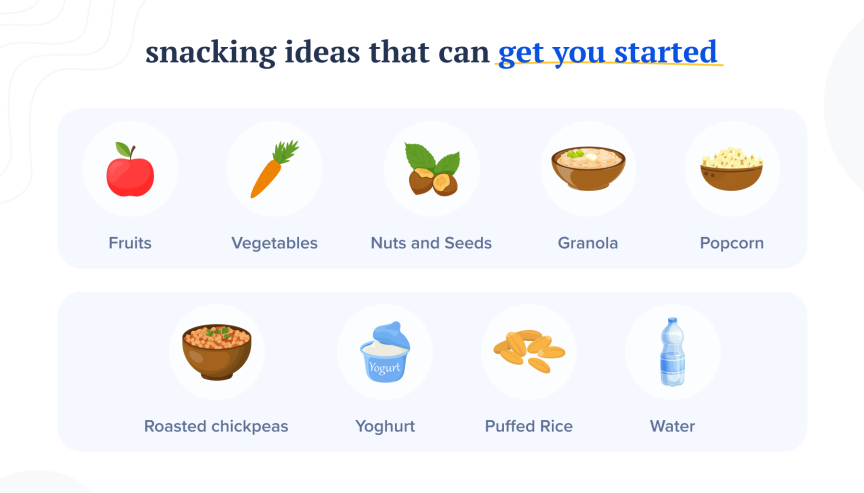Learn why leading HR professionals trust ekincare! Explore Now

While the COVID-19 pandemic normalised work from home for many of us, something else was a common theme. A lot of us have put on weight, or at least we know someone who did. We talked to over 50 such people and zeroed in on one culprit - unhealthy snacks! Can you relate to this problem? Then this article is for you!
Whether working from the office or stationed at home, snacking smart has many benefits besides maintaining a healthy weight. Snacking right can help us maintain our energy throughout the day, work smarter, think better, and just be better.
 A pro tip for staying hydrated!
A pro tip for staying hydrated!We all know how important fruits are to our health. They supply essential nutrients for glowing skin, strong hair, a healthy body, and a sound mind. This can mean the difference between having to order medicines and supplements vs eating a naturally enriched diet. What we often don’t realise is that many fruits are low in calories.
Also, fruits are abundant in natural sugars that can maintain our blood glucose levels and energise us at work. High fibre in fruits can keep us fuller for longer periods and improve our gut health (soluble fibre is a great prebiotic). Here are some fruits you can eat without creating a mess at work
Veggies are often dense in terms of nutrition and have really low calories compared to any other food group. Munching and chewing on crunchy veggies can be great for dental hygiene. Also, much like fruits, veggies are high in fibre and can be a blessing to a good gut microbiome. They also bulk up your stools and help you with smooth excretion. Combining veggies with healthy homemade dips like hummus, salsa, and ranch can turn them into snacks you absolutely love. Here are a quick couple of suggestions.
Granola is a dry, golden brown, baked snack usually made of rolled oats, honey, natural sweeteners such as dates, figs, raisins (or other dried fruits), puffed rice, nuts, and seeds. There are many granola recipes out there, and you can easily customise your favourite version of granola by mixing and matching a bunch of ingredients.
Like any good snack, this can be made light with all-natural ingredients. Granola is usually high fibre and keeps you satiated for a long time. Since this is also nutrition-rich and has adequate natural sugars, granola can be your way of snacking smart on busy work days. Also, to keep your granola healthier, use less sugar with moderate quantities of nuts.Serving size recommended - Calories in granola can widely vary based on the ingredients used and their proportions. A good serving recommendation would be 20 - 40 grams (¼ to ½ cup) which are roughly 100 calories.
Did you ever wonder why popcorn is so famous at the movies? The short answer - popcorn is easy to make and costs nearly nothing. When done right, it can also be a fairly healthy snack. Popcorn is mostly carbs and fibre. It is super low in calories and can keep you full for a long time. This makes it an ideal snack for the office. So the next time you are at work and hungry, air pop a few corn kernels in a microwave for 2 minutes, sprinkle some salt and spices and enjoy your snack. Some nice popcorn seasonings are available on the market, and these can really flavour your snack.Serving size recommended - 3 cups of regular popcorn or 4 cups of air-popped popcorn (a little less than 100 calories)
*1 Cup = 236 ml
Chickpeas, in general, are nutrition-packed with healthy carbs, high protein, and high fibre. Despite the number of snack varieties in India, roasted chickpeas remain one of the favourite street snacks to date. While there are many packaged brands that you can buy from, packaged versions tend to be high in sodium content, which is not healthy for you for several reasons. Instead, easily make these at home in batches. Use your favourite seasonings to keep it interesting and stay fit at the workplace.Serving size recommended - ¼ to ½ cup
Yoghurt tastes amazing, and many people agree with it. That is just one reason to say it’s great at the workplace. Here are some other reasons:
That said, choose your yoghurt wisely. Homemade yoghurt is obviously great. But if you are choosing packaged ones, go for non-sweetened or naturally sweetened (with fruits) versions. Also, choose greek yoghurt for high protein and whole milk yoghurt to keep it natural. Be wary of high-sugar variants.
If you need to describe puffed rice in one word, it has to be ‘light’. One cup of puffed rice is just 14 g in weight and contains around 50 calories of energy. You can either maintain minimal ingredients and quickly whip up a bhel puri or simply sprinkle your favourite seasoning and consume your puffed rice as is.
While water is not food, consuming water frequently can reduce bloating, improve digestion and lubricate the digestive tract. Water helps you lose excess pounds. Last but not least, all those extra trips to the restroom can be your excuse to move around and stay healthy at the workplace.
Tip: To improve your habit of drinking water frequently, consume herbal teas or start flavouring your water with natural fruit or vegetable extracts.

Snacking doesn't have to be unhealthy. Here are a few parting pro tips to avoid unhealthy snacking:
Schedule a demo to learn how your organisation can get the best employee health and well-being experience with ekincare's commitment to quality.